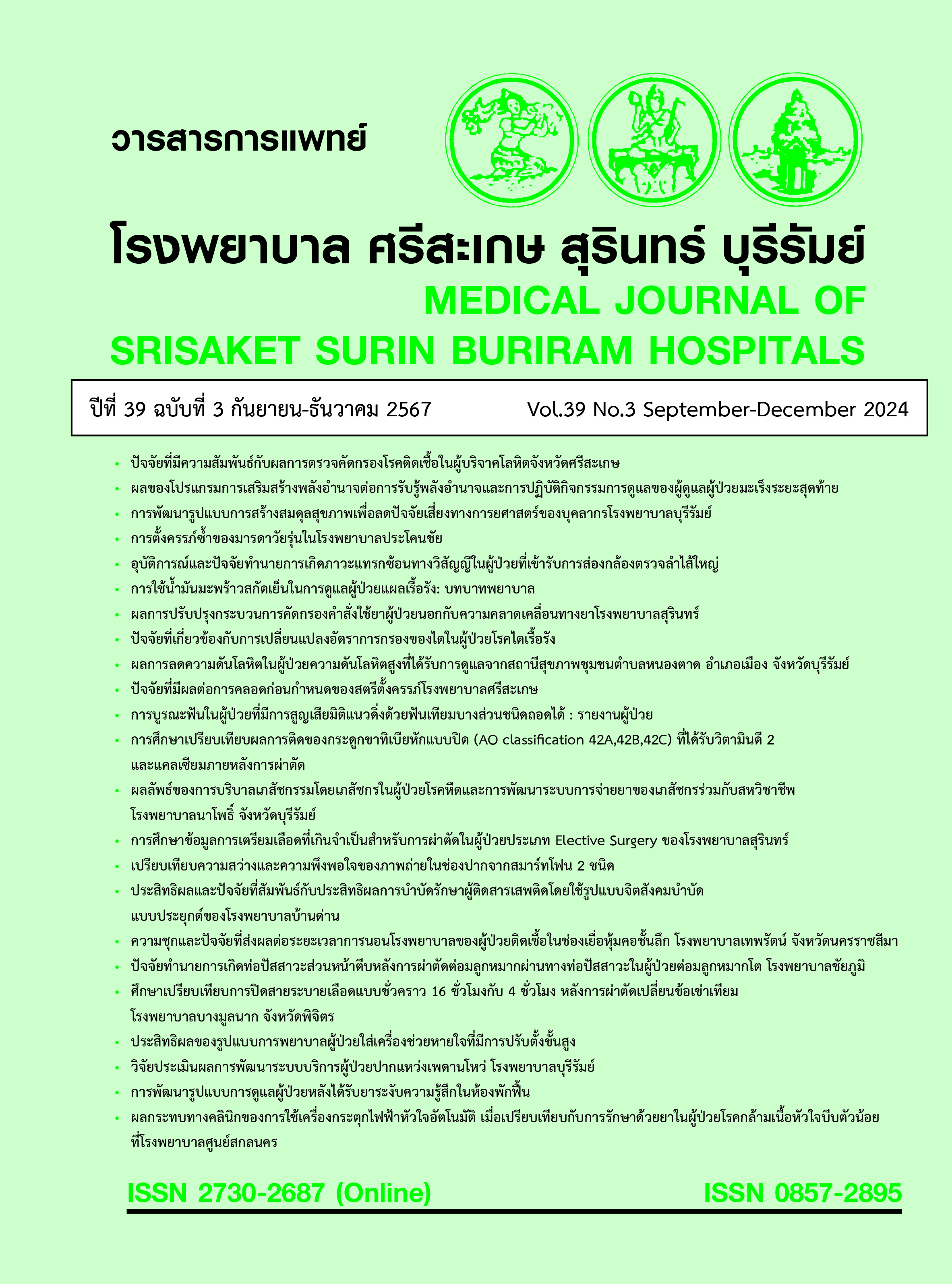Incidence and Factors Predicting Anesthetic Complications in Patients Undergoing Colonoscopy
Main Article Content
Abstract
Background: Colonoscopy is a standard procedure for evaluating gastrointestinal problems and detecting colorectal cancer. During the colonoscopy, sedation is administered, which may lead to anesthesia-related complications.
Objective: To determine the incidence and predictive factors of anesthetic complications in patients undergoing colonoscopy.
Methods: A retrospective predictive study was conducted. Purposive sampling was employed to recruit 606 patients who tested positive for occult blood in stool and those with gastrointestinal abnormalities, which registering to participate in the colorectal cancer screening program at Prasat Hospital, Surin Province. Data were analyzed by using logistic regression statistics.
Results: The incidence of anesthetic complications among individuals undergoing colonoscopy was found to be 17%. The analysis identified significant predictive factors for anesthetic complications, including body mass index, ASA classification, type of anesthetic drug, dosage of propofol.
Conclusion: The incidence of anesthetic complications in patients undergoing colonoscopy is 17%. Predictive factors for anesthetic complications include body mass index, ASA classification, type of anesthetic drug, and the dosage of propofol. The findings of this study can be used to plan care and prevent anesthetic complications in patients undergoing colonoscopy.
Article Details

This work is licensed under a Creative Commons Attribution-NonCommercial-NoDerivatives 4.0 International License.
References
World Health Organization. Colorectal cancer 2023. [Internet]. [Cited 2023 1 October]. Available from:URL: https://www.who.int/news-room/fact-sheets/detail/colorectal-cancer.
สมาคมแพทย์ระบบทางเดินอาหารแห่งประเทศไทย. อุบัติการณ์มะเร็งลำไส้ใหญ่ทั่วโลก ปี 2563. [อินเตอร์เน็ท]. [สืบค้นเมื่อ 1 ตุลาคม 2566]. ค้นได้จาก:URL: https://www.gastrothai.net/th/knowledge-detail.php?content_id=347.
สมชาย อมรโยธิน. การให้ยาระงับความรู้สึกสำหรับการตรวจและรักษาความผิดปกติของระบบทางเดินอาหาร. กรุงเทพฯ : บริษัท พี เอ ลีฟวิ่ง จำกัด ; 2561.
ภีรนาฎ ศรีแสน, เกียรติตะวัน กิ่งแฝง. ภาวะแทรกซ้อนของการส่องกล้องลำไส้ใหญ่ซึ่งเตรียมลำไส้ด้วยโซเดียมฟอสเฟตภายใต้การให้ยานำสลบต่อเนื่องทางน้ำเกลือในโรงพยาบาลชุมแพ. วารสารโรงพยาบาลนครพนม. 2565;9(3):1-18.
วิไลวรรณ ศิริสัจจวัฒน์. ภาวะแทรกซ้อนที่พบในการระงับความรู้สึกผู้ป่วยส่องกล้องแบบผู้ป่วยวันเดียวกลับในโครงการคัดกรองมะเร็งลำไส้ใหญ่และไส้ตรงที่โรงพยาบาลรัตนบุรี. วารสารการแพทย์โรงพยาบาลอุดรธานี. 2566;31(1):16-23.
Benson M, Hubers J, Caldis M, Gopal D, Pfau P. Safety and Efficacy of Moderate Sedation in Super Obese Patients Undergoing Lower and Upper GI Endoscopy: a Case-Control Study. Obes Surg 2020;30(9):3466-71. doi: 10.1007/s11695-020-04600-6.
Sidhu R, Turnbull D, Haboubi H, Leeds JS, Healey C, Hebbar S, et al. British Society of Gastroenterology guidelines on sedation in gastrointestinal endoscopy. Gut 2024;73(2):219-245.
doi: 10.1136/gutjnl-2023-330396.
Carrick MA, Robson JM, Thomas C. Smoking and anaesthesia. BJA Educ 2019;19(1):1-6. doi: 10.1016/j.bjae.2018.09.005.
Zongming J, Zhonghua C, Xiangming F. Sidestream capnographic monitoring reduces the incidence of arterial oxygen desaturation during propofol ambulatory anesthesia for surgical abortion. Med Sci Monit 2014;20:2336-42. doi: 10.12659/MSM.891023.
Lian Q, Chen S, Cheng X, Zhang J, Yu W, Zhou R, et al. Capnographic monitoring reduces hypoxia incidence in older patients undergoing gastrointestinal endoscopy under propofol sedation: study protocol for a multicenter randomized controlled trial. Trials 2023;24(1):192. doi: 10.1186/s13063-023-07208-0.
Peduzzi P, Concato J, Kemper E, Holford TR, Feinstein AR. A simulation study of the number of events per variable in logistic regression analysis. J Clin Epidemiol 1996;49(12):1373-9. doi: 10.1016/s0895-4356(96)00236-3.
Khalid-de Bakker CA, Jonkers DM, Hameeteman W, de Ridder RJ, Masclee AA, Stockbrügger RW. Cardiopulmonary events during primary colonoscopy screening in an average risk population. Neth J Med 2011;69(4):186-91. PMID: 21527807
Lieber SR, Heller BJ, Martin CF, Howard CW, Crockett S. Complications of Anesthesia Services in Gastrointestinal Endoscopic Procedures. Clin Gastroenterol Hepatol 2020;18(9):2118-27.e4. doi: 10.1016/j.cgh.2019.10.011.
Sneyd JR, Absalom AR, Barends CRM, Jones JB. Hypotension during propofol sedation for colonoscopy: a retrospective exploratory analysis and meta-analysis. Br J Anaesth 2022;128(4):610-22. doi: 10.1016/j.bja.2021.10.044.
Lee A, Chui PT, Chiu CH, Tan PE, Tam TP, Samy W, et al. Risk of perioperative respiratory complications and postoperative morbidity in a cohort of adults exposed to passive smoking. Ann Surg 2015;261(2):297-303. doi: 10.1097/SLA.0000000000000544.
Lin OS. Sedation for routine gastrointestinal endoscopic procedures: a review on efficacy, safety, efficiency, cost and satisfaction. Intest Res 2017;15(4):456-66. doi: 10.5217/ir.2017.15.4.456.
Lera dos Santos ME, Maluf-Filho F, Chaves DM, Matuguma SE, Ide E, Luz Gde O, et al. Deep sedation during gastrointestinal endoscopy: propofol-fentanyl and midazolam-fentanyl regimens. World J Gastroenterol 2013;19(22):3439-46. doi: 10.3748/wjg.v19.i22.3439.


